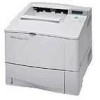HP 4100n HP LaserJet 4100 Series - User Guide - Page 150
Troubleshooting optional HP Fast InfraRed Receiver problems, Explanation - laserjet cleaning
 |
View all HP 4100n manuals
Add to My Manuals
Save this manual to your list of manuals |
Page 150 highlights
Troubleshooting optional HP Fast InfraRed Receiver problems Troubleshooting HP Fast InfraRed Receiver problems Item Explanation FIR port status indicator does not light up. Make sure that the printer is in READY mode and that the FIR port you are printing from is IRDA-compliant and within the range of operation described in the user guide for the HP Fast InfraRed Receiver. Make sure that the HP Fast InfraRed Receiver is properly connected to the printer. Print a configuration page (see "Configuration page" on page 152). Make sure that "FIR POD (IRDA Compliant)" is printed under Installed Personalities and Options. Connection cannot be established or seems to take longer than usual. Use a device that is IRDA-compliant; look for an IRDA symbol on the device or see the computer's user guide for IRDA specifications. Connection often cannot take place because the computer does not have the software that is required for FIR. Make sure that the operating system on your computer includes an FIR driver and your application uses an HP LaserJet 4100, 4100N, 4100TN, 4100DTN, or compatible driver. Note that complex pages take longer to print. Position the HP Fast InfraRed Receiver within the range of operation described in the user guide for the HP Fast InfraRed Receiver. Make sure that no object is blocking the connection. (This object could be a hand, paper, books, or even bright light.) Make sure that the two IR ports are clean (free from dirt and grease). Bright light of any kind (sunlight, incandescent light, fluorescent light, or light from an infrared remote control, such as those used for TVs and VCRs) shining directly into one of the IR ports might cause interference. Make sure that no bright light is shining directly into either IR port. Position the portable device closer to the FIR port on the printer. The printer prints only part of a page or document. The connection has been broken during transmission. If you move the portable device during transmission, the connection can be broken. IRDA-compliant devices are designed to recover from temporary connection interruptions. You have up to 40 seconds to re-establish the connection (depending on the portable device being used). 148 Chapter 4 - Problem solving EN















